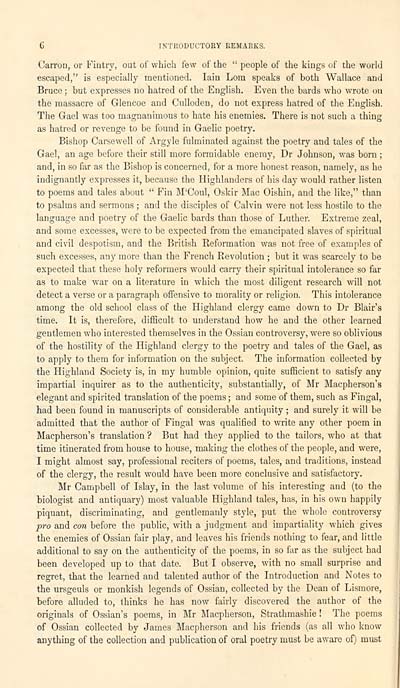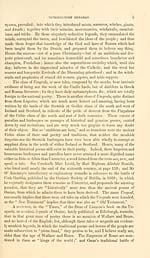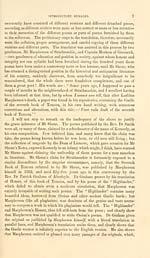Download files
Complete book:
Individual page:
Thumbnail gallery: Grid view | List view

6 INTKODUCTORY REMARKS.
Oarron, or Firiliy, out ol' which tew of the " people of the kings of the world
escaped," is especially mentioned. Iain Lom speaks of both Wallace and
Bruce ; but expresses no hatred of the English. Even the bards who wrote on
the massacre of Glencoe and Culloden, do not express hatred of the English.
The Gael was too magnanimous to hate his enemies. There is not such a thing
as hatred or revenge to be found in Gaelic poetr}\
Bishop Carsewell of Argyle fulminated against the poetry and tales of the
Gael, an age before their still more formidable enemy, Dr Johnson, was born ;
and, in so far as the Bishop is concerned, for a more honest reason, namely, as he
indignantly expresses it, because the Highlanders of his day would rather listen
to poems and tales about " Fin M'Coul, Oskir Mac Oishin, and the like," than
to psalms and sermons ; and the disciples of Calvin were not less hostile to the
language and poetry of the Gaelic bards than those of Luther. Extreme zeal,
and some excesses, were to be expected from the emancipated slaves of spiritual
and civil despotism, and the British Reformation was not free of examples of
such excesses, any more than the French Revolution ; but it was scarcely to be
expected that these holy reformers would carry their spiritual intolerance so far
as to make war on a literature in which the most diligent research will not
detect a verse or a paragraph offensive to morality or religion. This intolerance
among the old school class of the Highland clergy came down to Dr Blair's
time. It is, therefore, difficult to understand how he and the other learned
gentlemen who interested themselves in the Ossian controversy, were so oblivious
of the hostility of the Highland clergy to the poetry and tales of the Gael, as
to apply to them for information on the subject. The information collected by
the Highland Society is, in my humble opinion, quite suiScient to satisfy any
impartial inquirer as to the authenticity, substantially, of Mr Macpherson's
elegant and spirited translation of the poems ; and some of them, such as Fingal,
had been found in manuscripts of considerable antiquity ; and surely it will be
admitted that the author of Fingal was qualified to write any other poem in
Macpherson's translation ? But had they applied to the tailors, who at that
time itinerated from house to house, making the clothes of the people, and were,
I might almost say, professional reciters of poems, tales, and traditions, instead
of the clergy, the result would have been more conclusive and satisfactory.
Mr Campbell of Islay, in the last volume of his interesting and (to the
biologist and antiquary) most valuable Highland tales, has, in his own happily
piquant, discriminating, and gentlemanly style, put the whole controversy
■pro and con before the public, with a judgment and impartiality which gives
the enemies of Ossian fair play, and leaves his friends nothing to fear, and little
additional to say on the authenticity of the poems, in so far as the subject had
been developed up to that date. But I observe, with no small surprise and
regret, that the learned and talented author of the Introduction and Notes to
the ursgeuls or monkish legends of Ossian, collected by the Dean of Lismore,
before alluded to, thinks he has now fairly discovered the author of the
originals of Ossian's poems, in Mr Macpherson, Strathmashie ! The poems
of Ossian collected by James Macpherson and his friends (as all who know
anything of the collection and publication of oral poetry must be aware of) must
Oarron, or Firiliy, out ol' which tew of the " people of the kings of the world
escaped," is especially mentioned. Iain Lom speaks of both Wallace and
Bruce ; but expresses no hatred of the English. Even the bards who wrote on
the massacre of Glencoe and Culloden, do not express hatred of the English.
The Gael was too magnanimous to hate his enemies. There is not such a thing
as hatred or revenge to be found in Gaelic poetr}\
Bishop Carsewell of Argyle fulminated against the poetry and tales of the
Gael, an age before their still more formidable enemy, Dr Johnson, was born ;
and, in so far as the Bishop is concerned, for a more honest reason, namely, as he
indignantly expresses it, because the Highlanders of his day would rather listen
to poems and tales about " Fin M'Coul, Oskir Mac Oishin, and the like," than
to psalms and sermons ; and the disciples of Calvin were not less hostile to the
language and poetry of the Gaelic bards than those of Luther. Extreme zeal,
and some excesses, were to be expected from the emancipated slaves of spiritual
and civil despotism, and the British Reformation was not free of examples of
such excesses, any more than the French Revolution ; but it was scarcely to be
expected that these holy reformers would carry their spiritual intolerance so far
as to make war on a literature in which the most diligent research will not
detect a verse or a paragraph offensive to morality or religion. This intolerance
among the old school class of the Highland clergy came down to Dr Blair's
time. It is, therefore, difficult to understand how he and the other learned
gentlemen who interested themselves in the Ossian controversy, were so oblivious
of the hostility of the Highland clergy to the poetry and tales of the Gael, as
to apply to them for information on the subject. The information collected by
the Highland Society is, in my humble opinion, quite suiScient to satisfy any
impartial inquirer as to the authenticity, substantially, of Mr Macpherson's
elegant and spirited translation of the poems ; and some of them, such as Fingal,
had been found in manuscripts of considerable antiquity ; and surely it will be
admitted that the author of Fingal was qualified to write any other poem in
Macpherson's translation ? But had they applied to the tailors, who at that
time itinerated from house to house, making the clothes of the people, and were,
I might almost say, professional reciters of poems, tales, and traditions, instead
of the clergy, the result would have been more conclusive and satisfactory.
Mr Campbell of Islay, in the last volume of his interesting and (to the
biologist and antiquary) most valuable Highland tales, has, in his own happily
piquant, discriminating, and gentlemanly style, put the whole controversy
■pro and con before the public, with a judgment and impartiality which gives
the enemies of Ossian fair play, and leaves his friends nothing to fear, and little
additional to say on the authenticity of the poems, in so far as the subject had
been developed up to that date. But I observe, with no small surprise and
regret, that the learned and talented author of the Introduction and Notes to
the ursgeuls or monkish legends of Ossian, collected by the Dean of Lismore,
before alluded to, thinks he has now fairly discovered the author of the
originals of Ossian's poems, in Mr Macpherson, Strathmashie ! The poems
of Ossian collected by James Macpherson and his friends (as all who know
anything of the collection and publication of oral poetry must be aware of) must
Set display mode to: Large image | Transcription
Images and transcriptions on this page, including medium image downloads, may be used under the Creative Commons Attribution 4.0 International Licence unless otherwise stated. ![]()
| Early Gaelic Book Collections > Blair Collection > Treatise on the language, poetry, and music of the Highland clans > (18) |
|---|
| Permanent URL | https://digital.nls.uk/76236601 |
|---|
| Description | A selection of books from a collection of more than 500 titles, mostly on religious and literary topics. Also includes some material dealing with other Celtic languages and societies. Collection created towards the end of the 19th century by Lady Evelyn Stewart Murray. |
|---|
| Description | Selected items from five 'Special and Named Printed Collections'. Includes books in Gaelic and other Celtic languages, works about the Gaels, their languages, literature, culture and history. |
|---|

